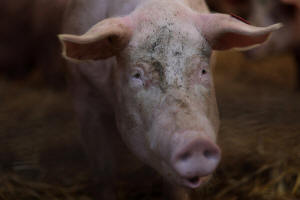US pork firms divided over bill in Congress to overturn California
animal welfare law
 Send a link to a friend
Send a link to a friend
 [August 02, 2023] By
Leah Douglas [August 02, 2023] By
Leah Douglas
(Reuters) - Some big U.S. pork producers that have spent money to comply
with a California law requiring more living space for certain farm
animals are lukewarm about legislation proposed in the U.S. Congress
that would overturn the state law.
The National Pork Producers Council (NPPC), the pork industry trade
group, supports the Ending Agricultural Trade Suppression (EATS) Act, a
bill introduced by U.S. Senator Roger Marshall and Representative Ashley
Hinson that would curb the ability of states to regulate agricultural
products sold within their borders.
The lawmakers have said their aim in part is to overturn California's
Proposition 12, which bars sales in the state of pork, veal, and eggs
from animals whose housing conditions fail to meet certain standards.
But Clemens Food Group, the No. 5 pork processor in the country, said it
does not support the EATS Act. Other big producers like Hormel,
Smithfield and Tyson have said publicly that they intend to comply with
the California law when it takes effect Jan. 1.
The NPPC has fought Proposition 12 since it passed by ballot initiative
in 2018. In May, the lobby group lost a case against the law before the
U.S. Supreme Court.

The group spent $780,000 between April and the end of June lobbying on
issues including the EATS Act, according to public filings.
Animal welfare groups say Proposition 12 is necessary because some sows
and hens are housed in cages so small they cannot turn around.
The NPPC's CEO Bryan Humphreys told Reuters in an email that the law
would not improve animal welfare, would raise costs for hog producers,
and could lead to more "ideological" state restrictions.
Some pork and egg companies, though, have already invested in bringing a
segment of their production into compliance with Proposition 12.
Clemens, a member of the NPPC, has invested capital and time upgrading
facilities and training its farmers to comply with the law, said COO
Chris Carey.
"We ultimately donít believe the EATS Act is aligned with progress in
animal welfare," Carey said.
Roughly a third of the egg industry, too, is already in compliance, said
Brian Moscogiuri, global trade strategist at egg supplier Eggs
Unlimited.
[to top of second column] |

A pregnant sow stands inside the hoop
barn, which features access to an outdoor fenced concrete pasture at
Randy Hutton Jr.ís farm, an independent farm with Niman Ranch in
Chestertown, Maryland, U.S., July 27, 2023. REUTERS/Leah Millis/File
Photo

Hormel Foods, Smithfield Foods, and Tyson Foods did not respond to
questions about the EATS Act.
If the EATS Act passes, food companies could lose the ability to
differentiate their product in the marketplace and court a higher
price, said Galina Hale, an economics professor at the University of
California-Santa Cruz.
The bill could also void over a thousand state and local public
health and safety regulations because it is broadly written,
according to a report by Harvard Law School's Animal Law & Policy
Program.
"Every aspect of this is going to be challenged by one side or
another," said Chris Green, the program's executive director.
PASTURED PIGS
If Proposition 12 holds, more hog farming could look like Randy
Hutton, Jr.,'s operation in Chestertown, Maryland, a rural town on
the state's Eastern Shore.
Hutton Jr. raises hogs for Niman Ranch, a subsidiary of meat company
Purdue Farms that advertises its high animal welfare standards. His
pregnant sows are kept in a fenced pasture, rather than the
gestation crates common in confinement hog farming, and have at
least 35 square feet each to move around, he told Reuters during a
recent visit.
Niman Ranch opposes the EATS Act. All of its 750 ranchers are in
compliance with Proposition 12, said vice president of
communications Kerri McClimen.
Hutton Jr. said he was drawn to raising sows on pasture because it
was less expensive than building a confinement barn, which can cost
upward of $700,000.

"We were looking for more diversification," he said. "This was
affordable."
(Reporting by Leah Douglas; Editing by David Gregorio)
[© 2023 Thomson Reuters. All rights
reserved.]
This material may not be published,
broadcast, rewritten or redistributed.
Thompson Reuters is solely responsible for this content. |